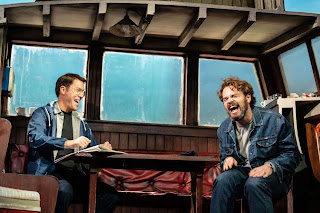The premise is simple and the play pretty much does what it says on the tin: Shaw and his co-stars spend hours every day on the boat, waiting for Spielberg and the crew to tell them they've managed to set up a shot long enough to shoot a few moments of the film.
On top of the mechanical sharks the weather, light and bureaucracy of the local town also conspire to keep the men waiting endlessly between takes, and although they're on reasonably good terms, the pressure starts to cause friction, especially between the alcoholic Shaw and the young, neurotic Richard Dreyfuss (Liam Murray Scott.) Playing peacekeeper more often than not is the sensible, rather dull but likeable Roy Scheider (Demetri Goritsas.) Based on Robert Shaw's diaries from the time, the play could have gone in a Beckettian direction and used the men's boredom to explore existential themes; thankfully the writers have opted for a more straightforward comedy.
Not that there isn't a heartfelt side; there's a genuine affection for Shaw's father, who's shown as frustrated at having to make what he sees as a B-movie that's guaranteed to flop, impatient with Dreyfuss' declarations of wanting to play great theatrical roles without ever having put the time in on stage, and taking almost mischievous pleasure in creating an enigmatic persona for himself. But it also doesn't shy away from the darker side of him, particularly his drinking and the way he's haunted by his father's suicide when he was a child. Dreyfuss is the thorn in his side but essentially well-meaning, a mix of arrogance and paranoia that's unlikely to be completely unrelated to all the cocaine he's taking when they get back to land in the evenings, and increasingly on set as well: His misguided attempts to help Shaw with his drinking problem are ironic considering how cavalier he is with the drug addiction which would derail his own career a couple of years later.
But for the most part this is about providing a light-hearted take on a classic film, and reveal a few secrets of the troubled shoot that led to a genre-defining hit (infamously, the inability to get the shark on screen for more than a couple of scenes ended up being credited with much of the film's menace.) I could have done without quite so many jokes relying on the audience knowing about future events ("Steven's planning a film about aliens? What next, dinosaurs?") but for the most part it's very funny, character-led comedy as the three men (or two of them at least) clash, but even as things get increasingly aggressive there's still the feeling that they'll eventually part with affection.
In a play about people being permanently bored in a small space Guy Masterson's production avoids actually becoming boring itself, and the design helps the visuals from becoming too claustrophobic: Nina Dunn's projections work flawlessly both behind and in front of Duncan Henderson's boat set to place it in the middle of the sea, and even give the illusion of it being buffeted by the waves at times. And that boat interior develops a personality of its own - the actors occasionally have to scramble around the boat to get back to the crew, but for the most part they're in the cabin where Ian Shaw will eventually recreate his father's most famous speech from the film, and the tiny space seems to get larger as Robert Shaw finds increasingly creative hiding places for his booze. The Shark is Broken plays to the audience's nostalgia in the right way, giving us an entertaining behind-the-scenes look; and while both Ian Shaw's writing and performance are affectionate towards the father he can't have known too well (he would have been 8 when Robert Shaw died,) it's spiky enough not to tip over into hagiography.
The Shark is Broken by Ian Shaw and Joseph Nixon is booking until the 15th of January at the Ambassadors Theatre.
Running time: 1 hour 40 minutes straight through.
Photo credit: Helen Maybanks.





I just saw the latest version at the Canterbury Marlowe. Incredibly poignant. I felt the jokes about the future... "Sequels of remakes / corrupt Presidents" landed perfectly this week so we can get some relief to the current chaos in America.
ReplyDeleteI thought the play got better and better as it went on. I could watch this again straight away. I really believed it was real by the end.
Brilliant little one act play.